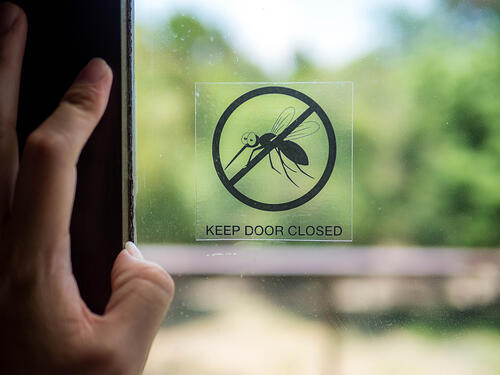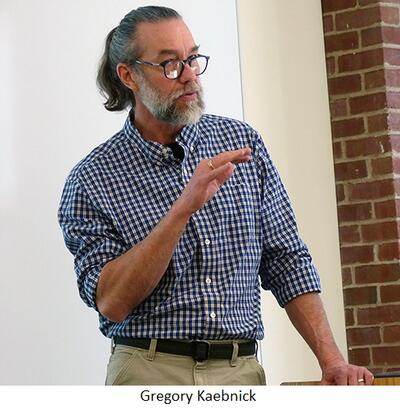The Ethics of Extinction and More: Yale’s Interdisciplinary Center for Bioethics Considers Our Relationship with Animals

At Yale’s Interdisciplinary Center for Bioethics, respect for life is right there in the name.
In part, the center, supported by the Institution for Social and Policy Studies (ISPS), explores the ethics of biomedical research and biomedicine on the biological health and wellbeing of humans.
But the prefix “bio” applies to all life on Earth. And so, the center also considers environmental ethics, animal ethics, ethics of law and policy, and ethics issues involving new technologies.
To address one segment of this broad subject, the center launched its Animal Ethics Working Group 17 years ago, attracting researchers, philosophers, lawyers, veterinarians, humanities students, and more. The group hears from experts and discusses issues such as the effects of climate change, factory farming, animal abuse, genetic engineering, invasive species, and more.
“This wildly diverse group of people giving their perspective on animal ethics topics has been hugely instructive for me,” said Lisa Moses, a veterinarian and bioethicist who chairs the Yale workshop and serves as co-director of the Capstone Program from the Master of Science in Bioethics Program at Harvard Medical School.
In 2018, Jessica Rubin, associate dean for experiential education and clinical professor of law at the University of Connecticut School of Law, spoke to the group about her role in creating and helping to pass legislation that allows Connecticut courts to appoint advocates in animal cruelty cases.
“When she came to talk about what it was like to work on getting that law enacted, we got a crash course in lobbying,” Moses said.
In April, the group hosted Gregory Kaebnick, director of research at The Hastings Center, a nonpartisan independent bioethics research institute, to discuss the ethics of using genome editing to cause the extinction of species that threaten human health or the balance of ecosystems.
“Through genome editing, we have tremendous powers to modify whole systems, add biodiversity, and save species,” Kaebnick said, suggesting the possibility of modifying coral to make it resilient to ocean acidification and warmer waters or altering the American chestnut tree to withstand blight. “We can develop powers to create but also powers to remove. Destructive powers. And there has been relatively little attention to that.”
In one example, Kaebnick discussed proposals to suppress the population of malaria-spreading mosquitos known as Anopheles gambiae, primarily in sub-Saharan Africa, by introducing either a bias for genes that produce sterile females or a bias to create a population that is mostly males, reducing each new generation’s capacity for reproduction.
Malaria kills about 600,000 people a year, four out of five of whom are children under 5 years old. Rates of infection have been rising since the COVID-19 pandemic, and medications to treat the disease are losing their efficacy, Kaebnick said.
“So, there is a huge public health impact and also a very significant impact on economies,” he said, weighing the ethics of elimination. “But we don’t entirely know what would happen if we were to get rid of Anopheles gambiae.”
But some ecologists believe that An. gambiae would not be greatly missed, he said. It does not appear to be an important food source for other species. And other species that do not spread malaria might fill any void left in the ecosystem. There are about 840 species of mosquitoes in Africa and 3,200 around the world, he said.
“To me,” Kaebnick said, “the fundamental question around eliminating Anopheles gambiae is: What do people in the affected countries themselves want to see happen? Any such program should include a public engagement endeavor.”
Yale Interdisciplinary Center for Bioethics Director Stephen Latham said he and his colleagues strive to help navigate such issues and inform ethical policies.
“Humans have manipulated animals’ environments, both purposefully and accidentally, for centuries,” Latham said. “We’ve manipulated their genes since pre-historic times. But now we are doing both of those things more quickly than ever.”
He said that humans’ unprecedented power over the natural world raises new ethical challenges.
“Since its founding, our center has been committed not just to biomedical ethics, but also to environmental and animal ethics issues,” Latham said. “We hope that interdisciplinary collaborations like our animal ethics group will help us make some progress on thinking our way through the proper use of our powers and knowledge and maybe guide us toward better-informed decisions and more responsible stewardship of our shared world.”
Alan Gerber, ISPS director and Sterling Professor of Political Science, praised the center’s commitment to engaging with experts as well as stakeholders and decision-makers across political, economic, and religious institutions.
“Through long-running programs like the Animal Ethics Working Group, the Interdisciplinary Center for Bioethics grapples with issues that in many ways define our humanity and our relationship with each other and the world around us,” Gerber said. “We are all alive on this planet for a limited time, and this work ensures that we understand what we owe to ourselves and future generations.”
Moses, whose veterinary practice specializes in pain relief, would like people to understand something about the intelligence and emotional lives of the animals we rely on.
“Whether or not you think you care about animals, animals are part of your daily life,” she said. “You make decisions all day about using animals — what you eat, what you wear, what products you use in the shower. Every medicine you use, every vaccine. Every advance we have in preventative health care came because we used animals to gain that knowledge.”
In particular, Moses hopes we could find a way to feed everyone on the planet in a sustainable way that does not involve what she characterizes as the cruel treatment of animals in industrial food production.
“We can make animals’ lives so much better in so many ways,” she said, suggesting that small changes in farming practices could affect billions of chickens around the world. “There’s lots and lots of ways for people to care about animals. If I had one wish it would be that people find their own way to contribute.”